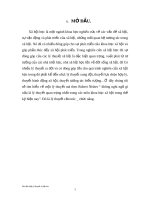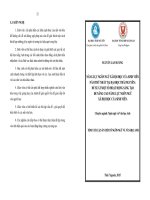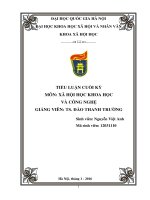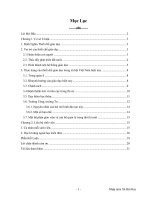TIỂU LUẬN NGÔN NGỮ XÃ HỘI HỌC
Bạn đang xem bản rút gọn của tài liệu. Xem và tải ngay bản đầy đủ của tài liệu tại đây (143.76 KB, 9 trang )
HUE UNIVERSITY
INSTITUTE OF OPEN EDUCATION
AND INFORMATION TECHNOLOGY
ENGLISH LANGUAGE
--------o0o--------
SOCIOLINGUISTIC PROJECT
Lecturer:
Trần Thuần
Student’s name:
Nguyễn Thị Thu Huyền - Số thứ tự 35
Student’s code:
7052900457
Class:
Nghe An 6
Topic 1:
1. There are systematic differences between the English spoken in the US
and the English spoken in the UK, hence the terms ‘American English’ and
‘British English’ due to historical and political reasons.
It is highly plausible that a similar phenomenon, historically and politically
triggered, can be found in the Korean language. Investigate the (possible)
differences between the Korean spoken in North Korea (Democratic People’s
Republic Korea) and the Korean spoken in South Korea (Republic of Korea).
Nghe An, July 2023
1. There are systematic differences between the English spoken in the US
and the English spoken in the UK, hence the terms ‘American English’ and
‘British English’ due to historical and political reasons.
It is highly plausible that a similar phenomenon, historically and politically
triggered, can be found in the Korean language. Investigate the (possible)
differences between the Korean spoken in North Korea (Democratic People’s
Republic Korea) and the Korean spoken in South Korea (Republic of Korea).
Assignment
The British actually introduced the language to the Americas when they
reached these lands by sea between the 16th and 17th centuries. At that time,
spelling had not yet been standardised. It took the writing of the first dictionaries to
set in stone how these words appeared. In the UK, the dictionary was compiled by
London-based scholars. Meanwhile, in the United States, the lexicographer was a
man named Noah Webster. Allegedly, he changed how the words were spelled to
make the American version different from the British as a way of showing cultural
independence from its mother country.
In terms of speech, the differences between American and British English
actually took place after the first settlers arrived in America. These groups of
people spoke using what was called rhotic speech, where the ‘r’ sounds of words
are pronounced. Meanwhile, the higher classes in the UK wanted to distinguish the
way they spoke from the common masses by softening their pronunciation of the
‘r’ sounds. Since the elite even back then were considered the standard for being
fashionable, other people began to copy their speech, until it eventually became the
common way of speaking in the south of England.
The English language is a global phenomenon, spoken by millions of people
around the world. However, it is important to recognize that there are systematic
differences between the English spoken in the United States and the English spoken
in the United Kingdom. These differences have led to the terms 'American English'
and 'British English' being used to distinguish between these two variations.
Historically and politically, these differences can be traced back to the
colonization of America by British settlers. As America gained independence from
Britain, it also developed its own unique cultural identity, which included language.
This resulted in linguistic changes and adaptations that eventually shaped American
English into its own distinct form.
In addition to historical factors, political influences have also played a role in
shaping these variations. The establishment of different educational systems, media
outlets, and cultural institutions in both countries has contributed to further
divergence in vocabulary, pronunciation, and grammar.
While there are many similarities between American English and British
English, such as shared vocabulary and grammatical structures, there are also
1
notable differences that can be observed in spelling (e.g., color vs. colour),
pronunciation (e.g., schedule), and idiomatic expressions (e.g., chips vs. fries).
Understanding these systematic differences is crucial for effective communication
across cultures and regions. It allows us to appreciate the richness of language
diversity while ensuring clear communication between speakers of different
variations of English.
In conclusion, the terms 'American English' and 'British English' exist due to
historical and political reasons that have shaped distinct variations of the language.
Recognizing these differences helps foster better understanding among speakers of
different backgrounds while celebrating the global reach of the English language.
The English language has evolved differently in various parts of the world,
resulting in systematic differences between the English spoken in the United States
and the United Kingdom. These differences have led to the terms 'American
English' and 'British English', which are used to distinguish between these two
variations. While historical and political factors have played a significant role in
shaping these linguistic differences, it is plausible that similar phenomena can
occur elsewhere, with language being influenced by specific events or
circumstances. Understanding these distinctions is crucial for effective
communication and cultural understanding between speakers of different varieties
of English.
The English language is a global phenomenon, spoken and understood by
millions of people around the world. However, it is important to recognize that
there are systematic differences between the English spoken in the United States
and the English spoken in the United Kingdom. These differences have led to the
terms 'American English' and 'British English', which highlight the unique
characteristics of each variant.
The distinction between American English and British English can be
attributed to historical and political factors. Throughout history, these two nations
have developed their own distinct cultures, traditions, and ways of speaking. This
has naturally influenced their respective versions of the English language.
From a political standpoint, it is worth noting that both countries have had
significant influence on global affairs. The United States emerged as a superpower
after World War II, while the British Empire once spanned across numerous
countries and territories worldwide. These historical and political contexts have
played a role in shaping how each country's version of English has evolved.
It is highly plausible that similar linguistic variations exist in other parts of the
world where historical and political factors have shaped language development.
Just as American English and British English differ due to their unique histories,
other regions may also exhibit distinct linguistic characteristics influenced by their
own cultural backgrounds.
2
Understanding these systematic differences between American English and
British English allows us to appreciate the richness and diversity within the realm
of language. It also highlights how languages evolve over time through various
influences. By recognizing these distinctions, we can foster better communication
across borders while celebrating our shared linguistic heritage.
The English language has undoubtedly evolved differently in various regions
across the globe, resulting in distinct variations known as "American English" and
"British English." These differences are not merely random but can be attributed to
historical and political factors that have shaped the development of the language in
each region.
The term "American English" refers to the variant of English spoken mainly
in the United States, reflecting the influence of British colonizers who settled in
America centuries ago. Over time, this form of English has diverged from its
British counterpart due to cultural and social influences, as well as regional
dialects.
Similarly, "British English" pertains to the variety of English spoken
primarily in the United Kingdom. Historically, British colonization and global
expansion led to this version being spread across vast territories where it underwent
local adaptations while preserving its core characteristics.
It is important to note that these differences do not diminish the mutual
intelligibility between American and British speakers. However, specific
vocabulary choices, spelling variations (such as color vs. colour), pronunciation
discrepancies, and even grammatical nuances demonstrate how historical and
political factors have shaped these linguistic variations.
Given this understanding of how historical and political events have
influenced American and British English, it is plausible that similar phenomena
have occurred elsewhere globally. The distinctive variants of global languages
could be attributed to regional history, politics, cultural encounters with other
languages or societies.
The linguistic nuances between American English and British English are
not merely a matter of pronunciation and vocabulary, but they also stem from
historical and political factors. These divergent versions of the English language,
often referred to as "American English" and "British English," have distinct
features that reflect their respective contexts.
The term "American English" acknowledges the unique language
developments that took place in the United States over time. From the country's
early settlement by European colonizers to its eventual independence, American
English has evolved independently with influences from various immigrant
communities. Similarly, "British English" encompasses the linguistic traditions that
have developed within the United Kingdom and its former colonies.
3
It is important to recognize that these differences go beyond spelling
variations and accents. They are deeply rooted in historical events and political
circumstances that have shaped each country's culture, identity, and language. For
instance, during the colonial era, British colonial policies had a significant impact
on language adoption among native populations in regions such as India.
As such, it is plausible to expect similar linguistic differentiations emerging
elsewhere in relation to historical and political triggers. We can anticipate unique
variations arising within societies influenced by specific historical events or
distinctive political trajectories.
By appreciating these systematic differences between American English and
British English as reflections of their particular histories and politics, we can better
understand how language evolves over time in response to socio-cultural contexts.
1, Spelling differences
British and American English have some spelling differences. The common ones
are presented in the table below.
British and American spellings diverge by the hundreds. This may be credited to
American lexicographer Noah Webster. The dictionary that bears Webster's name
may be a familiar name to you.
In the late 1700s, author, politician, and educator Noah Webster began an endeavor
to improve English spelling. The inconsistent spelling in English irritated him.
Webster sought to spell words as they appeared on the page. The spelling change
also showed America's independence from England. American spellings of words
like "color" (from "colour"), "honor" (from "honour"), and "labor" (from "labour")
show Webster's influence. Webster took the letter "u" out of these words so their
spelling would match how they were said.
British English
American English
-oe-/-ae- (e.g. anaemia, diarrhoea,
-e- (e.g. anemia, diarrhea,
encyclopaedia)
encyclopedia)
-t (e.g. burnt, dreamt, leapt)
-ed (e.g. burned, dreamed, leaped)
-ence (e.g. defence, offence, licence)
-ense (defense, offense, license)
-ell- (e.g. cancelled, jeweller,
-el- (e.g. canceled, jeweler, marvelous)
marvellous)
-ise (e.g. appetiser, familiarise,
-ize (e.g. appetizer, familiarize,
organise)
organize)
-l- (e.g. enrol, fulfil, skilful)
-ll- (e.g. enroll, fulfill, skillfull)
-ogue (e.g. analogue, monologue,
-og (e.g. analog, monolog, catalog)
catalogue)
*Note that American English also
recognizes words spelled with –ogue
-ou (e.g. colour, behaviour, mould)
-o (e.g. color, behavior, mold)
4
-re (e.g. metre, fibre, centre)
-y- (e.g. tyre)
-er (e.g. meter, fiber, center)
-i- (e.g. tire)
2, Vocabulary differences
The Americans and the British also have some words that differ from each
other. The table below lists some of the everyday objects that have different names,
depending on what form of English you are using.
The vocabulary is the most obvious difference between American English
and British English. Numerous standard terms have diverse meanings. For instance,
Americans refer to a car's front end as the hood, whereas the British refer to it as
the bonnet.
While Britons have holidays or hols, Americans go on vacation.
Londoners live in flats, whereas New Yorkers reside in apartments. There are a lot
more instances than we can list here. The majority of Americans and Britons,
fortunately, can typically infer the meaning from the context of a statement.
British English
American English
trousers
pants
flat
apartment
bonnet (the front of the car)
hood
boot (the back of the car)
trunk
lorry
truck
university
college
holiday
vacation
jumper
sweater
crisps
chips
chips
French fries
trainers
sneakers
fizzy drink
soda
postbox
mailbox
biscuit
cookie
chemist
drugstore
shop
store
football
soccer
3, Grammar differences
Aside from spelling and vocabulary, there are certain grammar differences between
British and American English. For instance, in American English, collective nouns
are considered singular (e.g. The band is playing). In contrast, collective nouns can
5
be either singular or plural in British English, although the plural form is most often
used (e.g. The band are playing).
The British are also more likely to use formal speech, such as ‘shall’,
whereas Americans favour the more informal ‘will’ or ‘should’.
Americans, however, continue to use ‘gotten’ as the past participle of ‘get’, which
the British have long since dropped in favour of ‘got’.
‘Needn’t’, which is commonly used in British English, is rarely, if at all used
in American English. In its place is ‘don’t need to’.
In British English, ‘at’ is the preposition in relation to time and place. However, in
American English, ‘on’ is used instead of the former and ‘in’ for the latter.
Final point
While there may be certain differences between British and American
English, the key takeaway is that the two have more similarities. Accidentally using
one instead of the other will not automatically lead to miscommunication.
Americans and Brits can usually communicate with each other without too much
difficulty, so don’t be too hard on yourself if you are unable to memorise the
nuances of both languages.
4, Auxiliary Verbs
Another grammatical distinction is auxiliary verbs. Helping verbs and
auxiliary verbs are verbs that contribute to the formation of a grammatical function.
They "assist" the primary verb by providing details regarding time, modality, and
voice.
Let's examine the subordinating verb "shall." The word shall is occasionally
used by the British to signify the future. For example, "I shall go home now."
Though they are familiar with its meaning, Americans hardly ever use the word in
speech. It has a formal air to it. "I'll go home now" is probably how Americans
would phrase it. British people may ask, "Shall we go now?" while Americans are
more likely to ask, "Should we go now?"
When Americans don't feel like they have to do something, they say "do not
need" after the helping verb "do." "We do not need you in the office today." Brits
omit the helping verb and use the word not."You need not report to work today."
5, Past Tense Verbs
Regular verbs also exhibit some slight irregularities in the past tense.
It is the past tense of "learn" in American English. In British English, you may use
either "learned" or "learnt." Learned and learnt, burned and burnt, and dreamed and
dreamt, all follow the same rules. The -t ending is more common in British English,
whereas the -ed ending is more common in American English.
6
When a verb is irregular, Americans sometimes add the suffix -en to show
that the verb is now in the past tense. The phrase "I have never got caught" is more
likely to be used by a Brit than an American. In American English, both got and
gotten may mean "had" in the past. Got is a universally understood British
expression.
Don't stress too much over the fact that irregular verbs tend to have subtle
differences in their past tense. Those from both countries know the other's method.
6, Tag Questions
Adding the tag question may transform a sentence from a declarative
statement into a question. For example, "This whole thing is sad, isn't it?" or "You
don't like him, do you?"
Pronouns with accompanying verbs (to be, to have, to do) form the tag.
Invoking tags prompts listeners to respond and show agreement. Tag questions are
also used by Americans, but much less often than in British English. These days,
Brits often use "innit?" slang to mean "isn't it".
7, Collective Nouns
The two versions of English have a few grammatical distinctions. Start by
looking at group nouns. Collective nouns are used to describe a group of people.
Collective nouns in American English are singular. For instance, the terms "staff,"
"band," and "team" denote groups of workers, musicians, and athletes, respectively.
"The band is excellent," as they would say in America.
However, collective nouns in British English may be either single or plural.
The phrase "The team are playing tonight" or "The team is playing tonight" may be
heard from a British speaker.
8, Two Ways To Show Possession
There are two verbs used in English to show that you possess something, especially
when speaking. They are "to have" and "have got" American English: Do you have
any friends here? British English: Have you got any friends here?
American English: They have an amazing new car. British English: They've got an
amazing new car. Both British and American English accept both forms, however,
Brit speakers prefer the use of "have got" while Americans speakers use "have" in
their sentences.
9, It Is Still English
English spoken in the United States and the United Kingdom is quite similar.
We believe the distinction between British and American English is often
7
overstated. If you can comprehend one style, you ought to be able to comprehend
the other style.
Most British and American citizens can communicate with one another without a
language barrier, with a few exceptions for regional accents. You can use movies to
help you distinguish between so many English accents if you are interested in this
topic!
The linguistic nuances between American English and British English are
not merely a matter of pronunciation and vocabulary, but they also stem from
historical and political factors. These divergent versions of the English language,
often referred to as "American English" and "British English," have distinct
features that reflect their respective contexts.
The term "American English" acknowledges the unique language
developments that took place in the United States over time. From the country's
early settlement by European colonizers to its eventual independence, American
English has evolved independently with influences from various immigrant
communities. Similarly, "British English" encompasses the linguistic traditions that
have developed within the United Kingdom and its former colonies.
It is important to recognize that these differences go beyond spelling
variations and accents. They are deeply rooted in historical events and political
circumstances that have shaped each country's culture, identity, and language. For
instance, during the colonial era, British colonial policies had a significant impact
on language adoption among native populations in regions such as India.
As such, it is plausible to expect similar linguistic differentiations emerging
elsewhere in relation to historical and political triggers. We can anticipate unique
variations arising within societies influenced by specific historical events or
distinctive political trajectories.
By appreciating these systematic differences between American English and
British English as reflections of their particular histories and politics, we can better
understand how language evolves over time in response to socio-cultural contexts.
8









